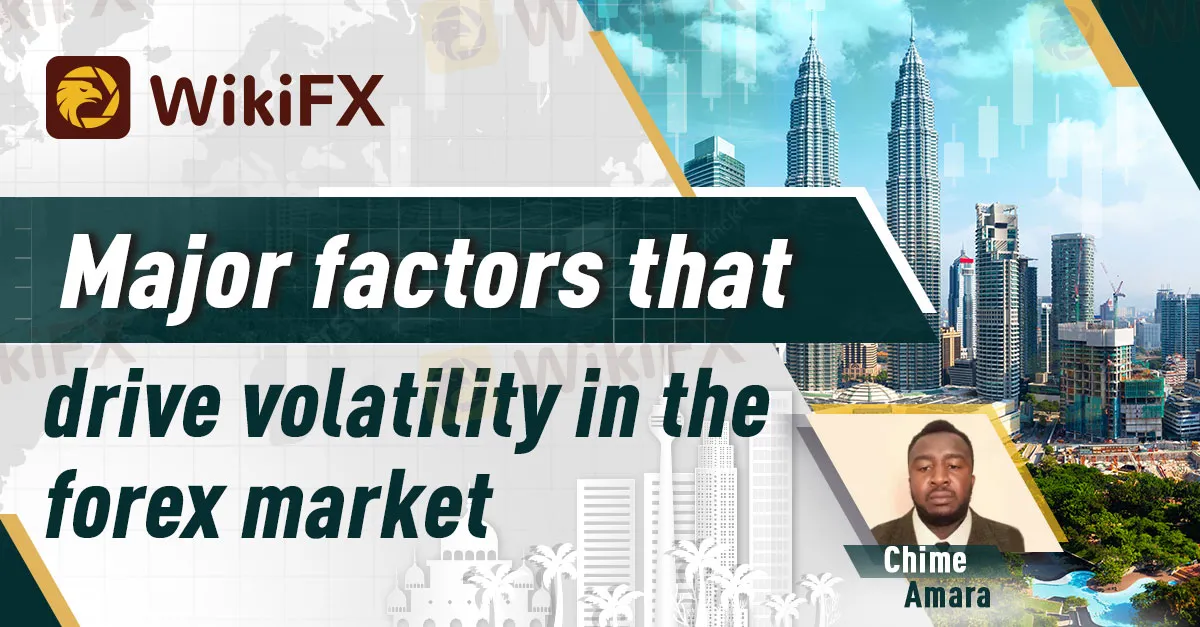简体中文
繁體中文
English
Pусский
日本語
ภาษาไทย
Tiếng Việt
Bahasa Indonesia
Español
हिन्दी
Filippiiniläinen
Français
Deutsch
Português
Türkçe
한국어
العربية
Major factors that drive volatility in the forex market
Abstract:The foreign exchange market, or forex, is one of the largest and most liquid markets in the world, with an estimated daily trading volume of over $6 trillion. As such, it is highly susceptible to volatility, which can be defined as the degree of fluctuation in prices over a given period. Understanding the factors that drive volatility in the forex market is essential for traders, investors, and analysts alike, as it can help them make informed decisions and manage risk.

By: Chime Amara

Major factors driving volatility in the forex market today
Here are some of the major factors that drive volatility in the forex market today:
A. Macroeconomic indicators: One of the primary drivers of volatility in the forex market is the release of macroeconomic indicators, such as GDP, inflation, and employment data. These indicators provide insight into the health of a country's economy and can impact the value of its currency. For example, if a country's GDP growth is higher than expected, its currency may appreciate, while weaker-than-expected GDP growth can lead to currency depreciation.
B. Central bank policies: Central banks play a critical role in the forex market by setting monetary policy, which includes adjusting interest rates and controlling the money supply. Changes in central bank policy can have a significant impact on currency values, as higher interest rates can attract foreign investment and strengthen a currency, while lower interest rates can weaken a currency.
C. Political events: Political events can also drive volatility in the forex market, particularly those that are unexpected or have a significant impact on a country's economic policies. For example, a change in government leadership or a shift in political ideology can lead to changes in fiscal and monetary policies, which can impact currency values.
D. Geopolitical risks: Geopolitical risks, such as conflicts, trade tensions, and natural disasters, can also drive volatility in the forex market. These events can create uncertainty and instability in the global economy, which can lead to changes in currency values.
E. Market sentiment: Finally, market sentiment can also drive volatility in the forex market. If traders and investors are optimistic about a currency's prospects, they may buy it, driving up its value. Conversely, if market sentiment turns negative, investors may sell a currency, leading to a decline in value.
Conclusion
The forex market is highly susceptible to volatility, which can be driven by a range of factors, including macroeconomic indicators, central bank policies, political events, geopolitical risks, and market sentiment. Understanding these drivers of volatility is essential for traders, investors, and analysts alike, as it can help them make informed decisions and manage risk.

Disclaimer:
The views in this article only represent the author's personal views, and do not constitute investment advice on this platform. This platform does not guarantee the accuracy, completeness and timeliness of the information in the article, and will not be liable for any loss caused by the use of or reliance on the information in the article.
Read more

Doo Financial Expands Regulatory Reach with Offshore Licenses in BVI and Cayman Islands
According to the report, Doo Group, a prominent Singapore-based online brokerage firm, has strengthened its global presence by securing new offshore licenses for its brokerage brand, Doo Financial. The company recently announced that entities under the Doo Financial umbrella have been granted licenses by two key offshore regulatory bodies: the British Virgin Islands Financial Services Commission (BVI FSC) and the Cayman Islands Monetary Authority (CIMA).

The Hidden Checklist: Five Unconventional Steps to Vet Your Broker
Forex broker scams continue to evolve, employing new tactics to appear credible and mislead unsuspecting traders. Identifying these fraudulent schemes requires vigilance and strategies beyond the usual advice. Here are five effective methods to help traders assess the legitimacy of a forex broker and avoid potential pitfalls.

Doo Financial Obtains Licenses in BVI and Cayman Islands
Doo Financial, a subsidiary of Singapore-based Doo Group, has expanded its regulatory footprint by securing new offshore licenses from the British Virgin Islands Financial Services Commission (BVI FSC) and the Cayman Islands Monetary Authority (CIMA).

CFI’s New Initiative Aims to Promote Transparency in Trading
A new programme has been launched by CFI to address the growing need for transparency and awareness in online trading. Named “Trading Transparency+: Empowering Awareness and Clarity in Trading,” the initiative seeks to combat misinformation and equip individuals with resources to evaluate whether trading aligns with their financial goals and circumstances.
WikiFX Broker
Latest News
ASIC Sues Binance Australia Derivatives for Misclassifying Retail Clients
WikiFX Review: Is FxPro Reliable?
Malaysian-Thai Fraud Syndicate Dismantled, Millions in Losses Reported
Trading frauds topped the list of scams in India- Report Reveals
AIMS Broker Review
The Hidden Checklist: Five Unconventional Steps to Vet Your Broker
Russia to Fully Ban Crypto Mining in 10 Regions Starting January 1, 2025
YAMARKETS' Jingle Bells Christmas Offer!
Why is there so much exposure against PrimeX Capital?
Doo Financial Expands Regulatory Reach with Offshore Licenses in BVI and Cayman Islands
Currency Calculator


